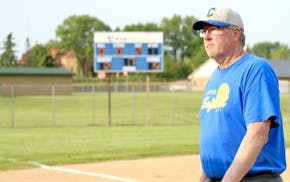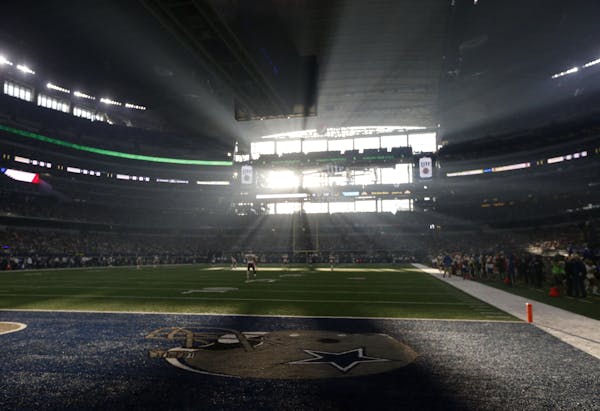Jerry Kill, once the poster bulldog of stubbornness in terms of ignoring his health for the betterment of coaching his football team, has been seizure-free for 14 months.
"I've lost 20 pounds," said Kill, the former Gophers coach. "I'm on a diet that seizure patients have. I'm exercising every day. I'm totally different than I was a year ago just because I had time to go take care of myself."
And all that 24/7 stress? Gone. The 365-day work year? Gone. Fighting the modern-day knee-jerk hiring and firing of coaches? Gone.
That has to be the happiest feeling ever, right Jerry?
Jerry?
Kill's laughter was followed by these words: "I miss coaching every day. I got a life [as associate athletic director at Kansas State], but I miss coaching every day. Every single day."
Kill watched the Vikings-Cowboys game on television Thursday night. He listened to NBC tell the tale of Vikings coach Mike Zimmer, who had to miss the game after undergoing emergency eye surgery the night before. Kill could relate because "I don't think there's a whole lot of difference between me and him."
Like Kill was for so many years as a disobedient epileptic patient, Zimmer has been dismissing doctors' advice. He kicked off November with his first surgery to repair a detached retina in his right eye. Then he went straight back to work, had a second procedure done a week later, pressed nose to grindstone even harder and closed out November with an emergency surgery after losing vision in the eye.
Most of us aren't eye doctors. But most of us can type "Google," hit send and read credible articles detailing the critical importance that rest plays in the recovery process for what Zimmer is going through. Nowhere does it say watch tape for hours with the good eye, report to work at 4:15 a.m. or, per an NBC report, put together a contingency plan to drive Zimmer 1,472 miles to his next game in Jacksonville.
"I would have done the same things as [Zimmer], as would every other coach," Kill said. "Keep fighting through it so you could coach that next game. Coaches are coaches. We're unique people in the fact that you work 365 days a year for the opportunities to coach a few amount of games. You don't feel like you can miss a day or a week to go figure something out. I sympathize for Coach [Zimmer] very much."
Arizona Cardinals coach Bruce Arians has told reporters he thinks a lot of his health issues are related to a lengthy coaching career.
"I know when I was at Temple my last year [1988], I was having three migraines a week," he said. "The day I got fired, I didn't have another migraine."
After the Cardinals lost to the Vikings on Nov. 20, Arians spent the night in the hospital with chest pains. He returned to work the next day.
Zimmer wasn't even the first coach to miss a Thursday game this season. Broncos coach Gary Kubiak missed one a month earlier because of "complex migraine condition."
In 2013, as Texans coach, Kubiak suffered a mini-strike and collapsed while running off the field at halftime of a game. That same year, then-Broncos coach John Fox missed a month after emergency heart surgery. He had been putting off surgery because he didn't want to leave his team.
"It's hard to even imagine your team playing and you're not there," said Super Bowl-winning Hall of Fame coach and current NBC TV analyst Tony Dungy. "I can tell you Mike [Zimmer] is going crazy. But Mike and all coaches have to realize that looking out for their health is the most important thing."
Dungy was in town Thursday with NBC. At 61, he's eight months older than the 60-year-old Zimmer. But Dungy walked away from coaching at age 52. Zimmer's first head coaching job didn't start until he was 57.
"I miss the relationships; I miss the guys," Dungy said. "I miss hearing about their families and what's going on in their lives. But the actual job itself? Winning and losing games? I don't miss that."
Like many old-school coaches, Zimmer spends many a night sleeping in his office. He makes no apologies for it and has pointed out the corner cabinet that houses his pull-out bed.
Dungy shudders at the thought. A former Gophers quarterback, Dungy's introduction to the NFL as a player came as a rookie free-agent defensive back for Chuck Noll's Pittsburgh Steelers dynasty in the late '70s.
"I'll never forget that first team meeting," Dungy said. "Chuck was as good as anyone who's ever done it. He stood up and said, 'You're getting paid to play football so that makes you a professional.' But don't think football is your life. If you make football your whole life, you'll leave the game disappointed. He lived that out, and I'm glad I played for him because that became my philosophy too."
Dungy's playing career was brief. After a year as a Gophers assistant coach, he joined Noll in Pittsburgh, where he became a defensive coordinator before his 29th birthday. It would take another 12 years before Tampa Bay hired him as a head coach in 1996.
The job he did as Vikings defensive coordinator under Denny Green from 1992 to 1995 is what finally pushed Dungy over the top as a head coaching candidate. As a pioneer among black coaches, Green became a mentor to Dungy, whom he first met in 1979, when Green was the special teams coach in San Francisco during Dungy's last season as a player.
"Working for Coach Noll and Denny Green here, we didn't sleep in the office, and I'm glad of that," Dungy said. "Some people function that way, and everybody has to do what they feel comfortable with. But I encourage my coaches and the guys who worked for me — Mike Tomlin, Jim Caldwell, Lovie Smith — that you can do it and be very successful but you can still do the other things and keep yourself grounded so that it doesn't compress in on you."
Kill suffered multiple seizures on and off the field, including one that caused him to miss a game at Michigan. He was asked how difficult it was to reject a doctor or a family member who was trying to advise or plead with him to put his health ahead of his team.
"For me, it wasn't very hard," Kill said. "That's what got me in trouble."
He said the family learns to understand.
"As for the doctor, you're going to look for the guy who is going to give you the right answer sometimes," Kill said. "You get a guy you trust and then you'll battle him at the end to go and do your job.
"But sooner or later it catches up to you. With me, it was the over-and-over part. It got to the point where I didn't think I was helping the team. I wore myself completely out. I just kept going until I finally crashed and burned. I'm sure Mike's situation is no different. I'm sure he has to be careful or he's going to lose his eye."
Mark Craig is an NFL and Vikings Insider. • Twitter: @MarkCraigNFL • E-mail: mcraig@startribune.com

Series: What's happening at the U as NIL rules rock college sports?

